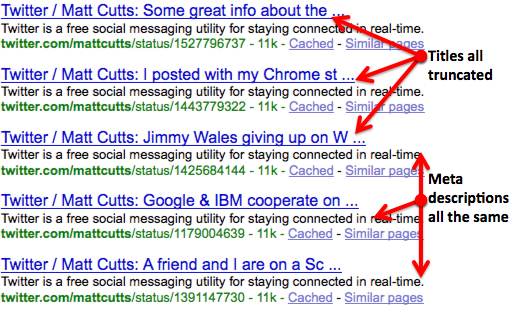Meta Description
Meta descriptions are the HTML attributes that provide concise explanations of the contents of web pages. Meta descriptions are commonly used on search engine result pages to display preview snippets for a given page.
Sample description code below :
<head><meta name="description" content="This is an example of a meta description. This will often show up in search results."></head>
What is a Meta Description?
Meta description tags, while not important to search engine rankings, are extremely important in gaining user click-through from SERPs. These short paragraphs are a webmaster’s opportunity to advertise content to searchers and to let them know exactly whether the given page contains the information they're looking for.
The meta description should employ the keywords intelligently, but also create a compelling description that a searcher will want to click. Direct relevance to the page and uniqueness between each page’s meta description is key. The description should optimally be between 150-160 characters.
Write Compelling Ad Copy
The meta description tag serves the function of advertising copy. It attracts readers to a web site from the SERP and therefore, is an especially vital a part of search marketing. Crafting a readable, compelling description using vital keywords can improve the click-through rate for a given webpage. to maximise click-through rates on program result pages, it is important to notice that Google and different search engines use bold keywords within the description when they match search queries.
Avoid Duplicate Meta Description Tags
As with title tags, it is important that meta descriptions on each page be unique. One way to combat duplicate meta descriptions is to create a dynamic and programmatic way to make unique meta descriptions for automated pages.
Not a Google Ranking Factor
Google
announced in September of 2009 that neither meta descriptions nor meta keywords factor into Google's ranking algorithms for web search. Google uses meta descriptions to return results when searchers use advanced search operators to match meta tag content, as well as to pull preview snippets on search result pages, but it's important to note that meta descriptions do not to influence Google's ranking algorithms for normal web search.
Quotes Cut Off Descriptions
Any time quotes are used in a meta description, Google cuts off the description. To prevent meta descriptions from being cut off, it's best to remove all non-alphanumeric characters from meta descriptions. If quotation marks are important in your meta description, you can change them to single quotes rather than double quotes to prevent truncation.
Sometimes it is Okay to Not Write Meta Descriptions
Although conventional logic would hold that it's universally wiser to write a good meta description, rather than let the engines scrape a given web page, this isn't always the case. Use the general rule that if the page is targeting between one and three heavily searched terms or phrases, go with a meta description that hits those users performing that search. If the page is targeting long-tail traffic (three or more keywords)—for example, with hundreds of articles or blog entries, or even a huge product catalog—it can sometimes be wiser to let the engines extract the relevant text, themselves. The reason is simple: When engines pull, they always display the keywords and surrounding phrases that the user has searched for. If a webmaster forces a meta description, they can detract from the relevance the engines make naturally. In some cases, they'll overrule the meta description anyway, but a webmaster can not always rely on the engines to use the more relevant text in the SERP.
When choosing whether or not to add a meta description, also consider that social sharing sites like Facebook commonly use a page's description tag when the page is shared on their sites. Without the meta description tag, social sharing sites may just use the first text they can find. Depending on the first text on your page, this might not create a good user experience for users encountering your content via social sharing.
Labels: SEO

